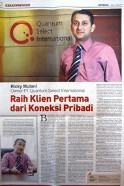
Why Cultural Compatibility is the Cornerstone of Multinational Business
In today's global world, as businesses spread their wings across borders, understanding cultural compatibility isn't just something companies do to look nice—it's essential. Cultural compatibility is the harmonious alignment of different cultures within an organisation. It's all about understanding, acknowledging and Leveraging cultural differences for collective growth.
In the realm of multinational businesses, these differences, if not addressed, can lead to misunderstandings, conflicts and even reduced productivity.
The Role of A Recruitment Firm in Cultural Compatibility
Modern technology has completely changed the international recruitment market and given companies access to talent all around the world, leading to the new era of cultural diversity more than ever before. It’s a challenge of its own for a company to bridge the deep historical roots of many cultures and adapt them to realise a harmonious professional collaboration while working to reach all the business goals. While it seems doubtful, a recruitment firm with years of experience is capable of making this fit a reality.
Other than providing many benefits ranging from cost saving and access to specialised skills, recruitment specialists are capable of providing a deep insight to match top talents with a company while considering their cultural compatibility. The effectiveness and success of recruiting global talents for companies can be considerably enhanced by ensuring a successful blend of cultures.
The Benefits of Cultural Compatibility
1. Effective Communication
At the heart of any successful business relationship lies clear and effective communication. Language, being the primary medium, plays a pivotal role. Businesses can ensure that ideas are transferred effortlessly and lower the likelihood of misinterpretation by outsourcing to areas with linguistic commonalities or excellent language ability.
2. Knowledge and Familiarity
Understanding cultural nuances and market trends in a customer’s region, in addition to language, may serve as an invaluable asset. When the outsourced team is culturally aligned, they are better equipped to stay updated with the client's industry trends. This not only ensures that the work delivered is of high quality but also that it resonates with the target audience.
3. Enhanced Productivity and Teamwork
A harmonious respect and understanding underpin successful professional relationships. Teams are less likely to clash when they have cultural affinities or are aware of one another's cultural origins.
Key Components Of Cultural Compatibility Implementation
Managing global personnel within international companies requires a tactical strategy that takes their differences in culture into account. To effectively navigate the complexities of a global workforce, it is important to consider several key factors:
1. Cultural Training
This training equips employees with the knowledge, skills, and cultural sensitivity needed to navigate various cultural backgrounds successfully. It helps them understand the nuances of different cultures, including communication styles, customs, and values, enabling smoother interactions and fostering mutual respect. Various aspects encompass cultural training involve:
- Language skills: Learning common phrases or key terms in the languages spoken within the organisation.
- Cultural awareness: Educating employees about cultural norms, taboos, and etiquette.
- Cross-cultural communication: Enhancing communication skills to bridge cultural gaps and avoid misunderstandings.
2. Inclusive Recruitment
Building a culturally inclusive and diverse workforce starts with having recruitment processes designed to attract talent from different cultural backgrounds. This involves actively seeking out and engaging with candidates from various ethnicities, nationalities, and cultural experiences. Diverse workforce not only enhances cultural diversity within the organisation but also brings a broader range of perspectives and ideas, fostering innovation and creativity. Key points of inclusive recruitment may include:
- Inclusive job postings: Crafting job descriptions and advertisements that appeal to a wide range of candidates and emphasise the company's commitment to diversity and inclusion.
- Outreach programs: Actively participating in outreach efforts to connect with diverse candidate pools, such as attending job fairs, partnering with multicultural organisations, and utilising diverse recruitment platforms.
- Unbiased hiring practices: Implementing fair and inclusive interview and selection processes that focus on skills, qualifications, and potential, rather than biases related to culture or ethnicity.
3. Vision Matching
Aligning the company's vision with the personal and professional aspirations of its employees ensures long-term commitment and success. Employees are more inclined to contribute constructively when they see a clear alignment between their own goals and the company's mission. Vision matching not only fosters employee loyalty and retention but also creates a shared sense of purpose that drives the organisation toward its strategic goals. Some main elements of vision matching may include:
- Clearly articulated company values and mission statements: Communicating the company's core values and long-term vision to employees, ensuring they understand and resonate with these principles.
- Individual development plans: Supporting employees in setting and achieving their career goals within the context of the company's mission, providing opportunities for skill development and advancement.
- Employee feedback and engagement: Continuously seeking feedback from employees to ensure their aspirations align with the company's direction, and addressing any concerns or discrepancies proactively.
Organisation can employ various strategies to review the fitness of multinational candidates by using the right assessment while also taking part in creating a suitable onboarding program to make sure their new hire can adapt and fit into the company working culture smoothly.
Unlocking Global Potential with Reqruit Asia
In the multinational business landscape, cultural compatibility is more than just a buzzword—it's the very foundation for companies to thrive in. The need for appreciating and comprehending cultural differences increases as businesses broaden their reach and market.
This is where Reqruit Asia steps in. With our expertise in international talent acquisition, we ensure you "Recruit Right, Recruit Fast, Recruit Asia." Partner with us to unlock unparalleled growth and innovation while gaining access to a global talent pool. Start your consultation with our team of professional and register to be part of the employer in Reqruit Asia now.




